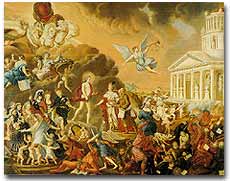66 Enlightenment out of Scientific Revolution
The AGE OF REASON, as it was called, was spreading rapidly across Europe. In the late 17th century, scientists like ISAAC NEWTON and writers like JOHN LOCKE were challenging the old order. Newton’s laws of gravity and motion described the world in terms of natural laws beyond any spiritual force. In the wake of political turmoil in England, Locke asserted the right of a people to change a government that did not protect natural rights of life, liberty and property. People were beginning to doubt the existence of a God who could predestine human beings to eternal damnation and empower a tyrant for a king. Europe would be forever changed by these ideas.
In America, intellectuals were reading these ideas as well. On their side of the Atlantic, Enlightened ideas of liberty and progress had a chance to flourish without the shackles of Old Europe. Religious leaders began to change their old dogmatic positions. They began to emphasize the similarities between the Anglican Church and the Puritan Congregationalists rather than the differences. Even COTTON MATHER, the Massachusetts minister who wrote and spoke so convincingly about the existence of witches advocated science to immunize citizens against smallpox. Harvard ministers became so liberal that YALE COLLEGE was founded in New Haven in 1707 in an attempt to retain old Calvinist ideas. This attempt failed and the entire faculty except one converted to the Church of England in 1722. By the end of the century, many New England ministers would become UNITARIANS, doubting even the divinity of Christ.
 Triomphe de Voltaire, by Duplessis” width=”230″ height=”181″ border=”0″>
Triomphe de Voltaire, by Duplessis” width=”230″ height=”181″ border=”0″>
Triomphe de Voltaire
New ideas shaped political attitudes as well. John Locke defended the displacement of a monarch who would not protect the lives, liberties, and property of the English people. JEAN-JACQUES ROUSSEAU stated that society should be ruled by the “general will” of the people. BARON DE MONTESQUIEU declared that power should not be concentrated in the hands of any one individual. He recommended separating power among executive, legislative, judicial branches of government. American intellectuals began to absorb these ideas. The delegates who declared independence from Britain used many of these arguments. The entire opening of the Declaration of Independence is Thomas Jefferson’s application of John Locke’s ideas. The constitutions of our first states and the UNITED STATES CONSTITUTION reflect Enlightenment principles. The writings of Benjamin Franklin made many Enlightenment ideas accessible to the general public.
The old way of life was represented by superstition, an angry God, and absolute submission to authority. The thinkers of the Age of Reason ushered in a new way of thinking. This new way championed the accomplishments of humankind. Individuals did not have to accept despair. Science and reason could bring happiness and progress. Kings did not rule by divine right. They had an obligation to their subjects. Europeans pondered the implications for nearly a century. Americans put them into practice first.

